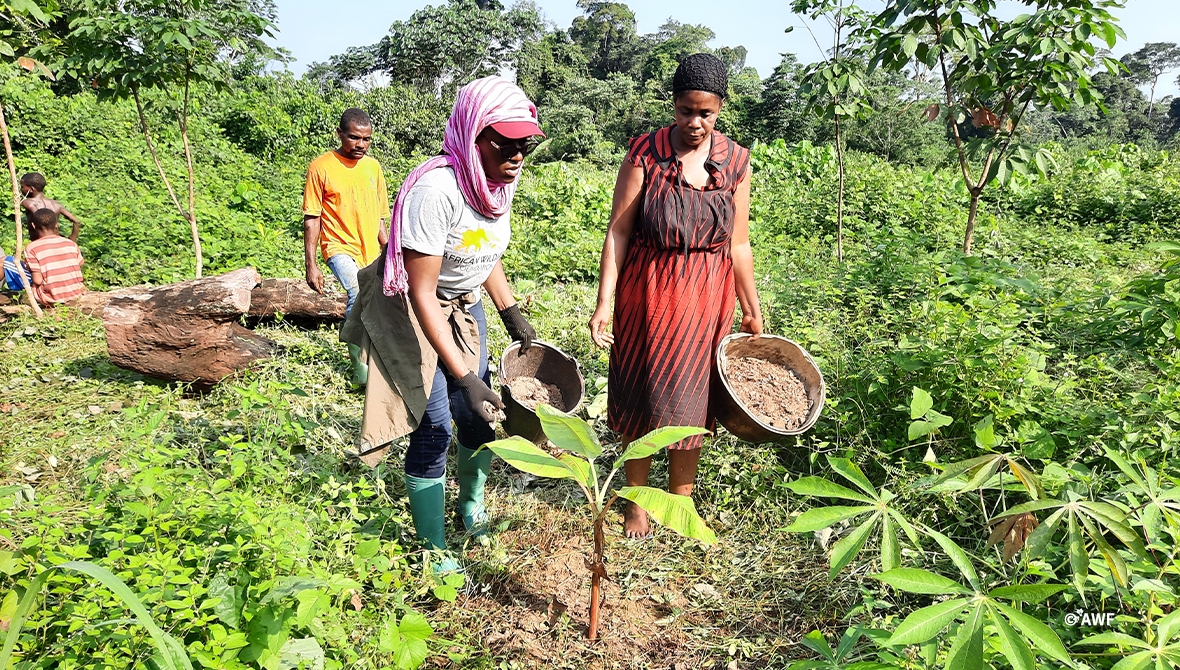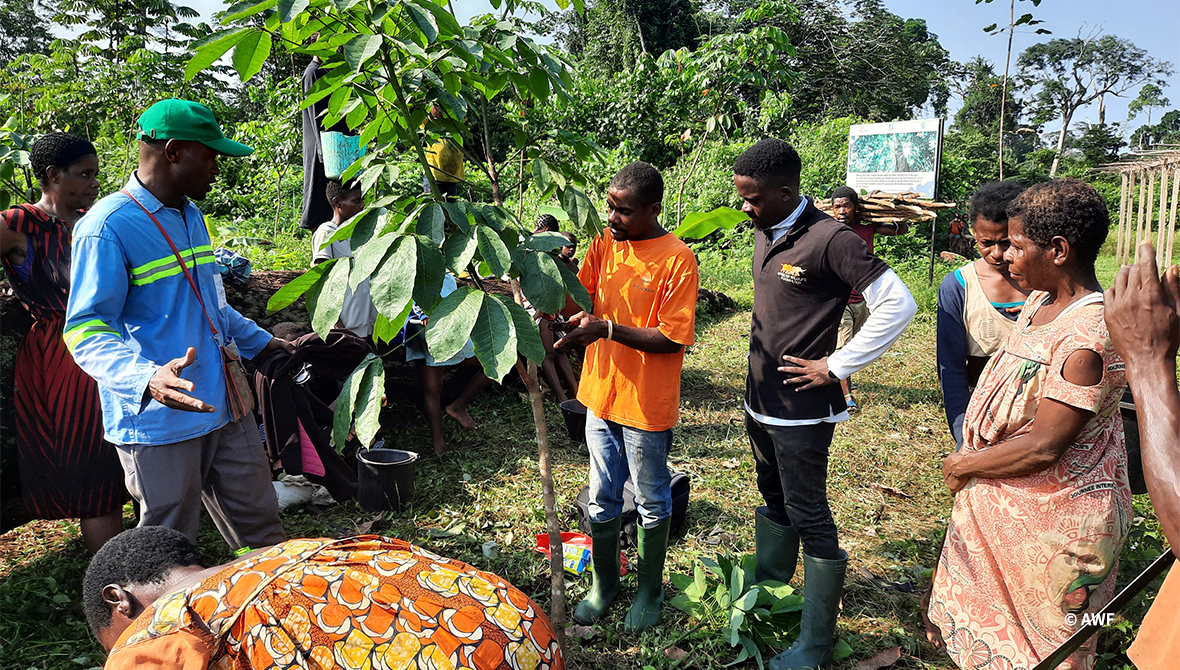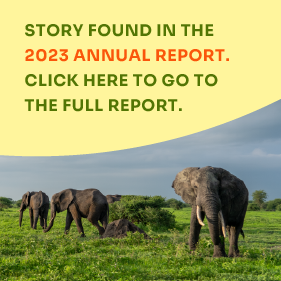Communities Profit from Nature-Based Small Businesses and Livelihoods in Cameroon

Plantain seedlings grown in a community nursery increase the productivity of the land on rubber farms.
AWF focuses on conservation solutions that create opportunity for people, not at the expense of wildlife and their habitats, but because of them. In FY23, we supported nature-based livelihoods across 11 of our 14 landscapes. In Cameroon, two examples stand out. In Dja, in southern Cameroon, we worked with local communities on increasing incomes with non-timber forest products and other strategies. In Campo Ma’an, on Cameroon’s western coast, we strengthened food security and created attractive alternative income opportunities to poaching with the local Indigenous community.
Communities Grow Incomes from Sustainable Use of Their Forest in Dja, Cameroon
The Dja landscape is in the south of Cameroon and includes the 526,000-hectare Dja Faunal Reserve (around the size of the Washington DC-Baltimore metro area, or twice the size of metropolitan Paris). In FY23, AWF concluded a five-year program designed to boost conservation-friendly agroforestry, agriculture, fish farming, and forest harvesting here. Community members learned to make household goods like soap and cosmetics from what they could harvest from the forest. They were then able to use the products themselves or offer them for sale. The program, which was funded by ECOFAC-6, also reduced poaching through training and equipping eco-guards. The results are impressive: local incomes increased by 78%, and poverty was reduced by 83%.
Through small training groups, AWF supported people in developing income opportunities from non-timber forest products (any plant or tree-based products from a forest besides cut timber) and cocoa production. Approximately 60% of the participants were women. Across the training groups, incomes increased by an average of 70%.
The non-timber forest products included the njangsang fruit and the moabi tree. Njangsang fruit contains nutritious edible kernels and seeds that can be processed into oil and sold to cosmetic companies. Seeds from the moabi tree are also processed into oil, and the multi-purpose tree produces edible fruit and medicinal bark. The moabi tree has historically been a popular source of timber, but based on AWF’s project, community members began to see more value in keeping the trees alive.
AWF also facilitated local stakeholder forums, bringing together local authorities, civil society organizations, public and private sector representatives, security forces, and local and Indigenous communities to collaborate on a vision for the landscape and its natural resources. The goal was to create a framework for ensuring accountability, transparency, and inclusivity around decision-making in the landscape.

Innovative agriculture techniques like agroforestry enable farmers to produce more crops—and do so sustainably.
Indigenous Communities Gain Opportunities in Campo Ma’an
Cameroon’s Campo Ma’an landscape is part of the rainforest on the western coast of Cameroon, very close to Kribi, a town of over 55,000 with a major seaport that exports goods like cocoa, timber, and coffee. The Campo Ma’an National Park is home to gorillas, chimpanzees, elephants, and over 80 other mammal species. Poaching, the illegal wildlife trade, logging, agriculture, and coastal development are threatening wildlife in the park and habitat around it.
In 2018, food insecurity in the landscape was forcing Indigenous Bagyeli communities to hunt for illegal bushmeat. In partnership with FEDEC and KfW, AWF introduced sustainable community farming, including the use of agroforestry, which is the practice of strategically integrating trees in agriculture. We helped seven villages establish a cooperative community nursery, where they grow cocoa and plantain. In the last half of FY23, we distributed 4,500 plantain seedlings, and by the end of the fiscal year, we delivered 38,000 cocoa plants to the seven villages. These seedlings improved land productivity and diversified food grown by the community. Overall, the agroforestry initiative successfully generated revenue, strengthened community food security, and created an attractive alternative income to poaching for the Bagyeli.
Women and Indigenous community members in particular have taken advantage of these interventions, which is significant, as Indigenous communities have historically suffered from under-investment and even harassment. To ensure that everyone has fair representation, we trained 500 people, including Indigenous people, rangers, park authorities, and local community members, in grievance and conflict management. Overall, 2,000 people were sensitized to the grievance process, which has improved community engagement and conflict resolution with rangers and park authorities.
"Before, we felt neglected, uninformed, and unable to exercise user rights. Now, the Grievance Mechanism builds trust, raises awareness, and empowers us to be involved in park management."
— His Majesty Ekangana Ango Charles of Nnemeyong village
